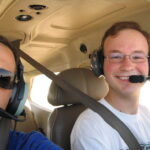
Key Takeaways
- The FAA Part 61 Exam is a pivotal step in becoming a certified pilot in the United States.
- It comprises a written test, an oral exam, and a flight test, each assessing different skill sets.
- Online practice tests are valuable tools for preparation, simulating real exam conditions.
- Choosing the right practice test platform can greatly influence your study effectiveness.
- Staying current with regulations and continuing education is crucial even after passing the exam.
Your First Step to the Sky: Decoding the FAA Part 61 Exam
Embarking on a journey to become a pilot is thrilling. It’s a path filled with learning, challenges, and ultimately, the freedom of the skies. A significant milestone on this journey is the FAA Part 61 Exam, a comprehensive assessment that ensures you have the knowledge and skills required to fly safely and confidently. Let’s dive into what this exam entails and how it paves the way for your aviation aspirations.
What is the FAA Part 61 Exam?
The FAA Part 61 Exam is not just a test; it’s a series of evaluations that measure your readiness to hold a Private Pilot License (PPL). Governed by the Federal Aviation Administration (FAA) under Title 14 of the Code of Federal Regulations (CFR) Part 61, it’s designed to test your theoretical knowledge, practical skills, and decision-making abilities. Think of it as your ticket to the pilot’s seat.
Key Components of the Exam
There are three key components to the FAA Part 61 Exam: the written test, the oral exam, and the flight test. Each serves a unique purpose in assessing your capabilities:
- Written Test: This is a computer-based multiple-choice test that covers a broad range of topics including aerodynamics, navigation, weather, and FAA regulations.
- Oral Exam: Conducted by an FAA examiner, this is a face-to-face conversation where you’ll demonstrate your knowledge of flight principles and safety practices.
- Flight Test: Also known as the checkride, this is where you’ll show your practical flying skills, from pre-flight checks to safe landing procedures.
Inside the FAA Part 61 Exam: What You Need to Know
Understanding the Written Test
First up is the written test. You’ll be given a set of questions, each with three possible answers. It’s essential to not only know the right answer but understand why it’s correct because the knowledge you gain here is foundational for safe flying. The FAA gives you 150 minutes to answer 60 questions, and you’ll need a score of 70% or better to pass.
But how do you prepare for such a comprehensive test? Study, and then study some more. Utilize resources like textbooks, online courses, and practice exams. Speaking of which, online practice tests are particularly helpful.
Mastering the Oral Exam
The oral exam can be the most nerve-wracking part for many students. It’s a dialogue with an examiner where you’ll need to demonstrate not just rote memory, but a deep understanding of flight concepts and decision-making under pressure. You’ll be asked about flight planning, emergency procedures, and how to adapt to changing flight conditions.
To prepare, review your written test materials and consider common scenarios you might encounter in the air. Practice explaining concepts aloud, as if teaching someone else, which can help solidify your knowledge and prepare you for the examiner’s questions.
Acing the Flight Test
Finally, the flight test is where you bring everything together. It’s your chance to show that you can not only talk the talk but walk the walk—or should we say, fly the flight. The examiner will observe as you perform pre-flight inspections, navigate, communicate, handle emergencies, and of course, take off and land.
Consistent practice with a certified instructor is key here. You should be comfortable with the aircraft and confident in your ability to handle a variety of situations. Remember, the examiner wants to see that you can fly safely and competently.
The Importance of the FAA Part 61 Exam in Your Aviation Journey
Why the Part 61 Exam Matters
The Part 61 Exam is more than just a regulatory hurdle; it’s a comprehensive evaluation of your readiness to be a pilot. It’s designed to ensure that you have the necessary knowledge, skills, and judgment to operate an aircraft safely. Passing this exam is a testament to your dedication and competence as a pilot.
The Impact on Your Pilot Career
Achieving a passing score on the Part 61 Exam is a significant achievement that opens the door to new opportunities. Whether you aim to fly recreationally or have career aspirations in aviation, this certification is the first essential step. It lays the groundwork for further certifications and ratings, each taking you higher in your aviation career.
Preparing with Online Practice Tests: A Smart Strategy
One of the most effective ways to prepare for the FAA Part 61 Exam is through online practice tests. These tests simulate the format and style of the actual exam, providing a realistic preview of what you’ll face on test day. They offer several advantages:
- Immediate feedback on your performance.
- Opportunity to identify and focus on areas that need improvement.
- Understanding the test structure and time management.
Most importantly, by regularly taking these practice tests, you’ll build confidence and reduce test anxiety. The familiarity with the exam format will make the actual test feel less intimidating and more manageable.
Choosing the Best Online Practice Test
With the vast array of online practice tests available, it’s crucial to choose a platform that offers quality and a realistic exam experience. Here’s what to look for when selecting an online practice test provider:
Features of Quality Online Practice Platforms
A top-notch online practice test platform should offer:
- A comprehensive question bank that covers all the topics you’ll encounter on the actual exam.
- Timed tests to help you get used to the pressure of working within the constraints of the exam duration.
- Performance tracking to monitor your progress over time and highlight areas where you need more study.
Additionally, a good practice test platform will provide detailed explanations for each question, helping you understand not just the correct answer, but also the reasoning behind it. This is critical for deepening your knowledge and ensuring you’re prepared for the nuanced questions you might face during the exam.
Top-Rated Online Practice Test Providers
Several online platforms are highly regarded for FAA Part 61 Exam preparation. These providers are known for their extensive question banks, user-friendly interfaces, and robust learning tools. Look for platforms with positive reviews from past users and endorsements from aviation educators.
Maximizing Your Study Sessions
Effective Study Habits
To make the most of your study time, it’s essential to develop effective habits. Here are some tips to help you study smarter:
- Set a regular study schedule and stick to it, ensuring that you cover all the material before the exam.
- Break down your study sessions into focused periods of time, with short breaks in between to keep your mind fresh.
- Use active learning techniques, such as summarizing information in your own words, to better retain knowledge.
Remember, consistency is key. Regular, dedicated study sessions are far more effective than cramming all the material in the days before the exam.
Techniques for Memorization and Application
Memorization is a necessary part of exam preparation, but it’s just as important to be able to apply what you’ve learned. To achieve this, employ the following techniques:
- Use mnemonic devices to remember lists and complex information.
- Engage in hands-on practice, such as using a flight simulator, to reinforce theoretical knowledge.
- Discuss concepts with peers or a study group to gain different perspectives and insights.
By combining memorization with practical application, you’ll be better equipped to handle the varied demands of the FAA Part 61 Exam.
On the Day of the Exam: Last-Minute Tips and Tricks
Managing Test Anxiety
It’s normal to feel some nerves before taking an important exam like the FAA Part 61. However, there are strategies to manage test anxiety and perform your best:
- Get a good night’s sleep before the exam day to ensure you’re well-rested and alert.
- Eat a healthy meal before the test to fuel your brain and maintain energy levels.
- Arrive at the test center early to avoid any last-minute stress and give yourself time to relax.
During the exam, take deep breaths and focus on the question at hand. Trust in the preparation you’ve done, and remember that you are well-equipped to tackle this challenge.
Navigating the Test Efficiently
On the day of the exam, efficiency is your best friend. To ensure you navigate the test efficiently, familiarize yourself with the test format beforehand through practice exams. Time management is crucial, so allocate your time wisely and don’t spend too long on any one question. If you’re unsure of an answer, it’s better to make an educated guess and move on, rather than getting stuck and potentially running out of time for other questions.
Also, read each question carefully. Misunderstanding a question can lead to a wrong answer, so take the time to ensure you know exactly what’s being asked. Lastly, review your answers if time permits, especially those you were uncertain about.
Maintaining Proficiency Beyond the Part 61 Exam
Staying Current with Flight Regulations
Passing the FAA Part 61 Exam is an accomplishment, but it’s just the beginning of your journey as a pilot. Aviation is an ever-evolving field, with flight regulations and procedures constantly being updated. To maintain proficiency, it’s essential to stay current with these changes. Subscribe to aviation newsletters, join pilot associations, and participate in recurrent training sessions to keep your knowledge fresh and relevant.
Continuing Education and Advanced Certifications
Furthermore, advancing your pilot training with additional certifications can open up new opportunities and enhance your skills. Consider obtaining an instrument rating, a multi-engine rating, or even a commercial pilot license. Each step not only broadens your horizons but also makes you a more competent and versatile pilot.
Continuous learning and improvement are at the heart of a successful aviation career. Embrace the journey of education—it’s a lifelong commitment that keeps you safe in the skies and makes flying an endlessly rewarding experience.
- Stay informed about regulatory updates by regularly checking FAA notices and advisory circulars.
- Participate in the FAA’s Wings Pilot Proficiency Program to engage in ongoing training and education.
- Consider advanced ratings and certifications to expand your flying capabilities and career prospects.
Frequently Asked Questions (FAQ)
How often is the FAA Part 61 Exam Updated?
The FAA Part 61 Exam is updated periodically to reflect changes in regulations, technology, and industry best practices. It’s important for aspiring pilots to use the most current study materials and resources when preparing for the exam to ensure they’re up-to-date with the latest information.
Can the Part 61 Exam be Retaken if Not Passed?
If you do not pass the FAA Part 61 Exam on your first attempt, you can retake it after receiving additional training and an endorsement from an instructor. There is no limit to the number of times you can retake the exam, but it’s important to thoroughly prepare to avoid multiple attempts.
What are the Costs Associated with the FAA Part 61 Exam?
The costs associated with the FAA Part 61 Exam can vary depending on the location and the flight school. Generally, you can expect to pay for the written test, the examiner’s fee for the oral and flight tests, and the aircraft rental for the flight test. It’s important to budget for these expenses as part of your overall training costs.
- Written test fee: Approximately $150-$165.
- Designated Pilot Examiner (DPE) fee: Varies, but typically ranges from $400 to $800.
- Aircraft rental for the flight test: Hourly rates depend on the aircraft type and flight school.
Remember to also consider the costs of study materials, online practice tests, and any additional training sessions you may need.
How Does the Part 61 Exam Differ from Part 141?
The FAA Part 61 Exam and Part 141 both lead to a Private Pilot License, but they differ in structure and training requirements. Part 141 schools are subject to more stringent standards and oversight by the FAA and often have a more structured, syllabus-driven program. In contrast, Part 61 is more flexible, allowing for a more self-paced and individualized training approach.
What Resources are Recommended for Part 61 Exam Prep?
There are numerous resources available to help you prepare for the FAA Part 61 Exam. These include:
- FAA’s Pilot’s Handbook of Aeronautical Knowledge and Airplane Flying Handbook.
- Online practice tests and question banks.
- Flight training textbooks and manuals.
- Study guides and prep courses offered by reputable flight training providers.
Utilizing a combination of these resources will give you a well-rounded understanding and prepare you effectively for the exam.
In conclusion, the FAA Part 61 Exam is a crucial step in your journey to becoming a pilot. By understanding the exam components, preparing with online practice tests, and maintaining proficiency through continuous education, you’ll be well on your way to achieving your aviation goals. Remember, the sky is not the limit—it’s just the beginning.






Leave a Reply